It may surprise some that a trial for domestic violence can proceed without the victim testifying. When this happens, defendant may still be convicted.
Why This Article Matters: If a victim of domestic violence is unavailable to testify at trial, defendant can still be convicted, but it may be more difficult than if the witness testifies at trial. To read about how such a conviction can nonetheless be reached, please read the article herein.
How can this happen, one may ask? Is not an out-of-court statement by a victim hearsay and thus inadmissible? Does not the victim need to come to court to testify to the jury and judge? After all, surely the prosecutor cannot just read the police report into evidence, right? That would be nothing more than hearsay, right? This is the “Hearsay Rule” (Evidence Code § 1200(b)), right?
The answer is that there are exceptions to the hearsay rule. They are listed out at Evidence Code §§ 1220 – 1380. There are also exclusions from the general rule that makes any out-of-court statement being offered for its truth hearsay.
For example, in People v. Hughey (1987) 194 Cal. App. 3d 1383, 240 Cal. Rptr. 269, a domestic violence victim, although available to testify, was not called by the prosecution. Instead, her statements were introduced through the testimony of one of the responding officers and were received as spontaneous statements under Evidence Code § 1240.
Also, while a preliminary hearing is not trial, many assume that the same evidentiary standards and rule apply. It merits mention that at a preliminary hearing, under Evidence Code § 872, hearsay can be introduced through the sworn testimony of certain “Prop 115” qualified officers, in order to facilitate a judge’s evaluation of whether probable cause exists to continue prosecution of the charges against defendant.
 Torrance Courthouse
Torrance Courthouse
The trouble that burdens the judge and perhaps even defendant is that domestic violence victims are often unavailable to testify at trial. The victim may be physically unavailable (i.e., dead, or deported, or her / his whereabouts unknown). The victim may also be “emotionally unavailable” and refuse to testify, either due to post traumatic stress disorder from the incident, financial dependence on defendant (if he goes to prison, her income stops) or due to threats from the victim’s family, her own family (i.e., in arranged marriages), or a criminal street gang.
Alternatively, even when the victim will testify, she or he may recant or minimize their prior statements concerning the events that led to defendant’s arrest.
Therefore, prosecutors have learned to contact the victim just before trial to gauge how the victim will testify, if at all, and whether a “back up plan” is necessary to rely on exceptions to the hearsay rule to introduce prior testimony or statements by the victim.
The big hurdle facing the prosecution is the U.S. Supreme Court ruling in Crawford v. Washington (2004) 541 U.S. 36, 124 S. Ct. 1354, 158 L. Ed. 2d 177, which repudiated Ohio v. Roberts (1980) 448 U.S. 56, 100 S. Ct. 2531, 65 L. Ed. 2d 597, consequently making the use of such prior statements or testimony more difficult. In Roberts, hearsay evidence was admissible in criminal cases as long as it fell within a traditional hearsay exception or was particularly trustworthy, as determined by the judge.
In Crawford, the U.S. Supreme Court held that more safeguards were needed. Crawford held that admitting “testimonial” hearsay statements against a criminal defendant violates the defendant’s Sixth Amendment confrontation clause rights unless:
- the declarant of the statement is unavailable to testify and be cross-examined at trial; and
- defendant had a prior opportunity to cross-examine the declarant of the statement, regardless of a judicial determination about the reliability of the statement(s). Id., 541 U.S. at 68.
Consequently, when a declarant of a statement is unavailable at trial, the prosecutor cannot admit testimonial evidence offered outside court against the defendant unless defendant previously had the chance to test its veracity in an adversarial setting. People v. Lewis (2006) 39 Cal.4th 970, 1028 n19, 47 Cal. Rptr. 3d 467.
In Crawford, defendant stabbed a man who allegedly tried to rape defendant’s wife. At trial, the prosecutor played to the jury the wife’s tape-recorded statement to police describing the stabbing, although defendant had no opportunity to cross-examine his wife first. Id., 541 U.S. at 38. The wife then did not testify at trial because of the Washington state marital privilege, which generally bars a spouse from testifying without the other spouse’s consent, but does not apply to out-of-court statements admissible under a hearsay exception. The U.S. Supreme Court held that admission of the wife’s statement without defendant having an opportunity to cross-examine her violated the Sixth Amendment.
Crawford left “for another day” a comprehensive definition of “testimonial.” Id., 541 U.S. at 68. This article will also “leave for another article” what type of statements qualify as “testimonial” sufficient to fall under the protection Crawford provides against a judge admitting a statement just because he or she thinks it qualifies as a hearsay exception and is reliable.
For more information about unavailable witness issues, please click on the following articles:
 Torrance Courthouse
Torrance Courthouse